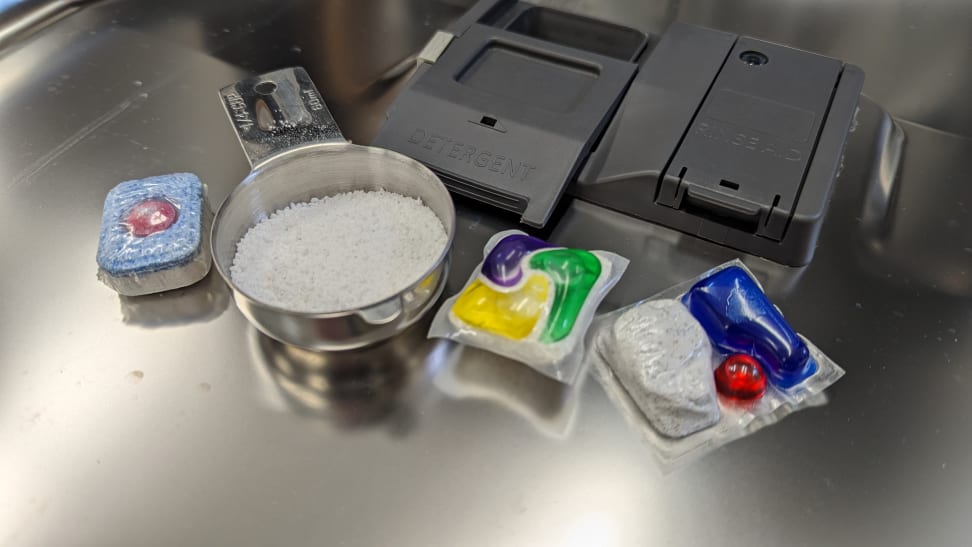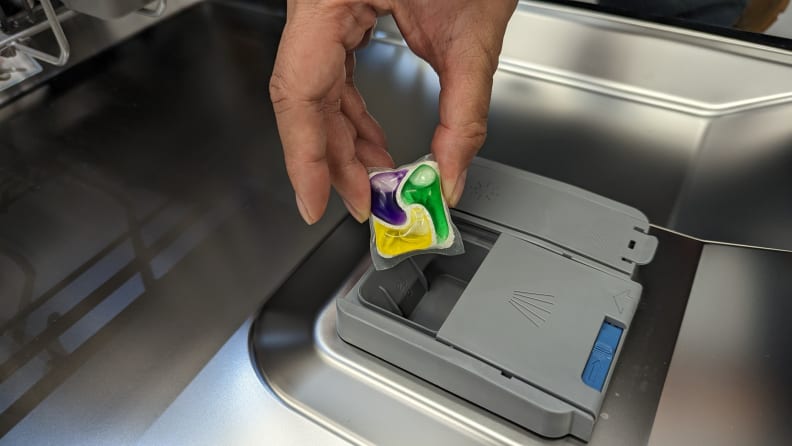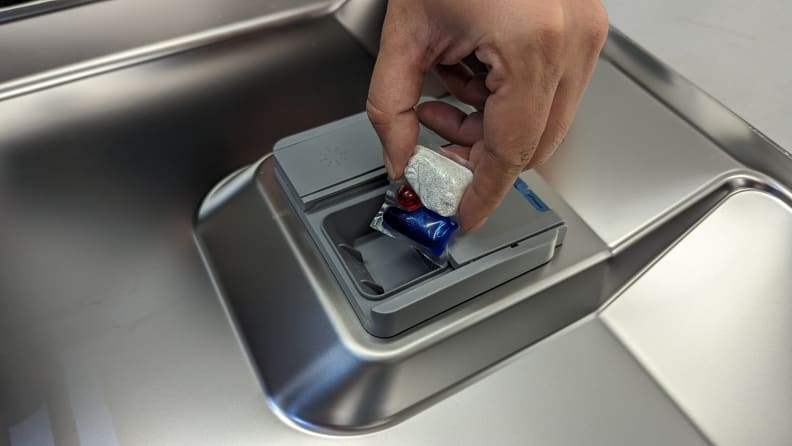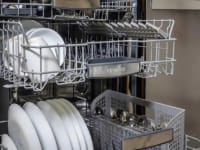Powder, gel, or tabs: Which dishwasher detergent cleans best?
Tablets and pods are top, but powder still has its place.
 Credit:
Reviewed / Dave Ellerby
Credit:
Reviewed / Dave Ellerby
Products are chosen independently by our editors. Purchases made through our links may earn us a commission.
Dishwasher detergents tackle a messy mix of chemicals when cleaning your dishes. This tough cleaning task needs something more complicated than soap.
Detergent manufacturers have developed a cocktail of ingredients to tackle different stains, tweak the chemistry of your water, and keep crud from resettling on your dishes.
Although dish detergents come as tablets, gel, or powder. Tablets and their close cousin, the gel pod, are the most popular type in the US.
We look at how dishwasher detergents work and tell you how to keep your dishes sparkling.
How does dishwasher detergent work?
Dishwasher detergents have to multitask to get the best results. These are their main functions:
Water Softening
All tap water contains minerals. These chemicals can stop cleaning agents from working at their best, damage your dishwasher by leaving deposits that block sprayer nozzles and reduce the shine on your dishes by leaving a chalky residue.
Salts react with the minerals to remove them from the water. In hard water areas, you may need a hard water dishwasher detergent like Finish Quantum Hard Water.
You can also minimize the problem with a dishwasher like the Bosch 800 series, one of the best dishwashers we’ve tested in our lab, that dispenses water-softening salts.
Phosphates used to be the go-to water softener but are now banned due to the environmental damage they cause. So modern dishwasher detergents are phosphate-free.
Stain removal
Bleach is the go-to stain remover. In modern detergents, this isn’t the harsh chlorine bleach you might see in a toilet cleaner. It’s usually sodium percarbonate, a chemical that forms hydrogen peroxide bleach.
Removing sugars, starches, and proteins
This is where dishwashers borrow from biology by using enzymes related to those that digest food. There’s usually a combination to break down carbs and proteins.
Fat removal
Fats are one of the toughest stuck-on foods to shift. Surfactants surround fat deposits and lift the greasy food particles off your dishes. Detergents also include alkaline chemicals like washing soda or baking soda to break down fats.
Tablets and pods are the best all-around option

Dishwasher tablets contain a mix of ingredients for the best cleaning performance.
If you look closely at the ingredients, tablets and pods are much more complicated than powdered detergent or gel.
This gives tablets and pods more cleaning power than simpler products as they combine a greater range of cleaning methods.
The pre-packaged design also means they’re convenient. Tablets mean there’s no chance of spilling and wasting detergent, and you don’t have to think about how much to use.
Tablets and pods aren’t perfect
Tablets and pods often contain fresh scents and brightly colored dyes. These don’t improve cleaning performance but do add to the number of chemicals going down the drain.
Unlike powder and gel, tablets and gel packs may be coated with polyvinyl alcohol (PVA). This dissolves in water, releasing the detergent, but also releases PVA into the wastewater.
PVA can be biodegradable, but there’s debate about how fully it breaks down.
If you're concerned about the ingredients in your dishwasher detergent, some products minimize unnecessary additives and are part of the [USDA Certified Biobased Products Program]. This certification recognizes products with ingredients derived from plant-based or renewable sources. Seventh Generation Dishwasher Detergent Packs are a good example of a well-reviewed product participating in the Biobased program.
There’s also the cost factor. Fancier tablets typically cost more per wash than simple powder or liquid detergent.
Where to put dishwasher tablets or pods

Place dishwasher tablets in the dispenser, just like you would for powder or gel.
Manufacturers strongly recommend placing dishwasher tablets or pods into the detergent dispenser. There’s some confusion here as laundry pods can be placed directly into the washing machine drum.
If you place dishwasher detergent pods or tablets directly into the dishwasher, they’ll dissolve too quickly. When you use the dispenser, the detergent is released throughout the wash cycle, leading to more effective cleaning.
Do you need rinse aid with dishwasher tablets?
Many tablets and pods also contain rinse aid. Does this mean you can do away with the separate rinse aid liquid?
Rinse aid is a surfactant that stops water droplets from forming on your dishes during drying. This limits mineral staining from hard water and helps your glassware shine.
In this case, use your own judgment. If you’re happy with how your glasses look, then skip the extra rinse aid. If you have hard water and dingy glasses, you may need extra rinse aid.
Other things to know about a dishwasher
Even with the best dishwashers and detergents, your dishes may not come out sparkling clean.
If your dishwasher isn’t cleaning dishes as well as you’d like, there are still things you can do to help.



